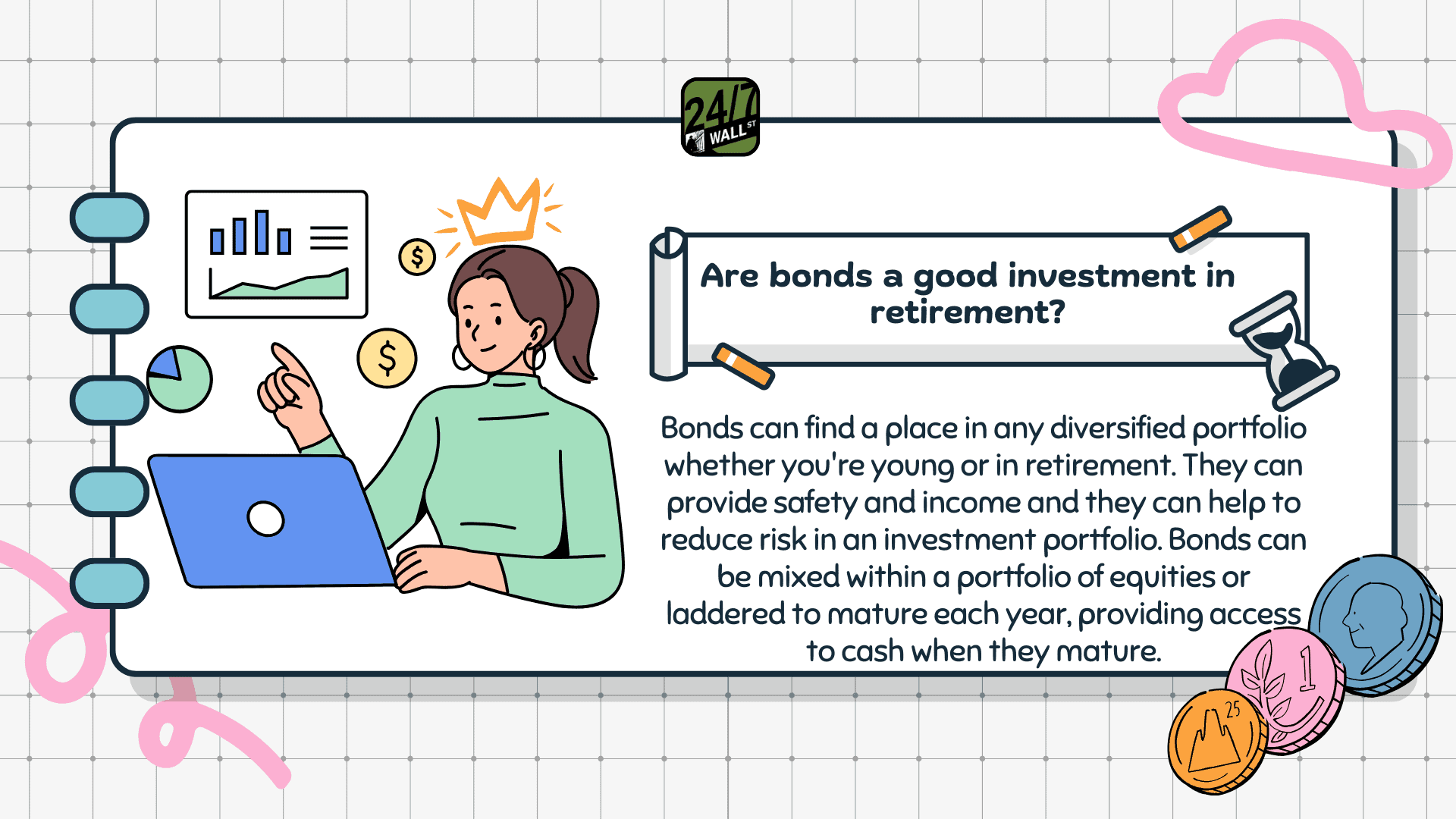Personal Finance
Retirees: 3 Bond ETFs You Can Buy and Sleep Well At Night

Published:
Last Updated:

Retirees could be in for tougher sledding going into 2025 as calls for lower prospective returns over the next year and decades grow louder. Undoubtedly, it can make sense to view a strong year or two as taking away from the potential gains in future years, especially if a rally has been given in large part by multiple expansion. Undoubtedly, numerous companies have seen their price-to-earnings (P/E) and price-to-sales (P/S) multiples swell over the past two years.
Indeed, much of the multiple expansion is warranted when it comes to certain companies that can be expected to grow their earnings and sales at an above-average rate due to a combination of tailwinds (think the rise of artificial intelligence and the broadening out of economic strength).

That said, some bid-up firms may be in for a bit of a “growth scare” of sorts should quarterly results come up short of expectations that are starting to get a tad lofty. Indeed, such a “growth scare” could cause multiples to contract and cause market volatility to kick things up a notch. With the Federal Reserve hinting at a slower pace of rate cuts (or a pause) moving forward after cutting rates by 25 bps on Wednesday, questions linger as to what the trajectory will look like in 2025.
Indeed, there’s some significant risk on the table as Fed chairman Jerome Powell goes hawkish. And though rate hikes aren’t on the table for now, I suppose anything is possible if 2025 sees tariff-driven inflation and continued economic strength. As expected, the latest Fed chatter startled investors, causing the S&P 500 and Nasdaq 100 to dive nearly 3% and 3.6%, respectively, in a single day. Indeed, it’s been a while since we’ve had such a turbulent day.
With the Dow Jones Industrial Average in the midst of a historic 10-day losing streak, while other major indices exhibit weakness, it’s looking like the Santa Claus rally could be off for 2024. In any case, retirees should get used to volatility surges like the one markets encountered Wednesday.
While I wouldn’t run to the hills with expectations of an imminent correction to start the new year, I do think it makes sense to ensure your portfolio is well-balanced and ready to navigate a potentially tougher year that could see far more modest returns than prior years.
Indeed, if you’ve stayed heavily invested in stocks through this epic two-year rally, perhaps you’re a tad overexposed to a specific stock, sector, or stocks as a whole. That’s why checking out bond ETFs could make sense: to prepare your portfolio for more choppiness so that you can sleep better at night as stocks hit a road bump.
The Vanguard Total Bond Market ETF (NASDAQ:BND) is a perfect one-stop-shop bond ETF for retired investors to set a path for smoother sailing going into 2025. The BND provides a decent mix of government and corporate bonds with an average duration of just north of six years, making it an ideal holding for retired investors looking for something to hold over the longer haul.
With a vast majority (over 68%) of the ETF allocated towards U.S. government bonds, you’re getting relative stability, impressive credit quality, and a reasonably bountiful 3.52% yield. Though the BND could still be a choppy ride as the Fed slows its pace of rate cuts, I still think the holding is a portfolio stabilizer, especially if there’s a bear market coming for stocks.
For those seeking high-quality bond exposure (think very heavy exposure to U.S. government bonds and AAA-rated corporate bonds) with shorter durations, the Vanguard Short-term Bond ETF (NYSEARCA:BSV) is tough to top. Like with the BND, you’re getting instant exposure to top-of-the-line investment-grade bonds.
With an average duration of around 2.6 years, though, the BSV stands to be a slightly less choppy ride than the BND. Though the yield (currently at 3.2%) is less rich, I do think that those seeking a somewhat smoother ride should prefer this shorter-duration name, especially if one doesn’t want to time the Fed.
Indeed, shorter-duration bonds entail less rate sensitivity. As the Fed slows its rate cuts and opens the door for a potential pause, perhaps the BSV ETF could make for a great complement to your portfolio.
If you’re looking for a bit of extra yield, it may be worth checking out the Vanguard Short-term Corporate Bond ETF (NASDAQ:VCSH), which currently sports a nice 3.8% yield. Undoubtedly, if you want a higher yield, though, there’s a trade-off, and that trade-off comes in the form of credit quality.
Still, you’re gaining exposure to the bonds of some very high-quality blue chips. And while the ride may not be as steady as a short-duration U.S. T-Bills, I’d argue that retirees looking for a better balance of yield and stability may wish to consider the ETF at current levels.
Start by taking a quick retirement quiz from SmartAsset that will match you with up to 3 financial advisors that serve your area and beyond in 5 minutes, or less.
Each advisor has been vetted by SmartAsset and is held to a fiduciary standard to act in your best interests.
Here’s how it works:
1. Answer SmartAsset advisor match quiz
2. Review your pre-screened matches at your leisure. Check out the advisors’ profiles.
3. Speak with advisors at no cost to you. Have an introductory call on the phone or introduction in person and choose whom to work with in the future
Thank you for reading! Have some feedback for us?
Contact the 24/7 Wall St. editorial team.